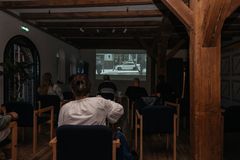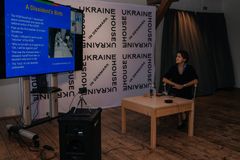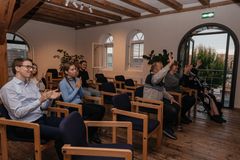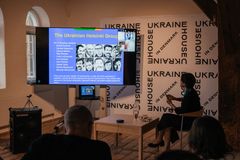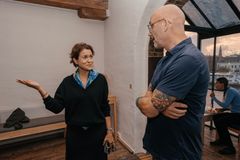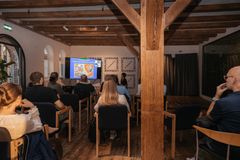Post-Release: Myroslav Marynovych on Courage, Conscience, and Confronting Today’s Russia
Copenhagen, Denmark – On 5 September, Ukraine House in Denmark was honored to host Myroslav Marynovych, a keystone dissident, co-founder of the Ukrainian Helsinki Group, Gulag survivor, and Vice-Rector of the Ukrainian Catholic University. The event shone a light on the courage of Ukraine’s human rights defenders in the 1960s and 70s, a generation that resisted the Soviet totalitarian machine when almost no one believed it was possible.
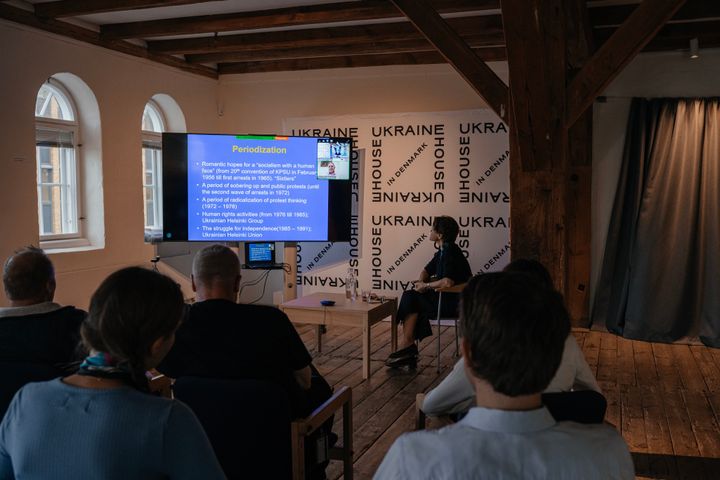
Opening the conversation, Nataliia Popovych, Chairperson of Ukraine House, placed Marynovych’s life story within a wider historical frame. She reminded the audience that many Ukrainians today have only a partial understanding of what it meant to withstand the Soviet system — its pervasive surveillance, ideological control, and violence. In the 1960s and 70s, Ukraine produced an entire generation of cultural and human rights defenders who chose to resist, knowing they would likely face prison or death. These were the years when poet Vasyl Stus, journalist Vyacheslav Chornovil, and other dissidents became symbols of conscience:
“Ukrainian patriots were still dying in the gulag in 1985, when much of the West was applauding Gorbachev.” To speak with Marynovych, she said, was to touch a living memory of that defiance.
Marynovych began by recounting his own journey from fear to freedom. In the early 1970s, while still a student living in a dormitory, he was reported to the KGB for criticizing the Soviet system in private conversations. The first summons left him terrified; at that time, fear was the natural condition of anyone who drew attention from the state. Yet everything changed in 1973, when he traveled to Kyiv and laid flowers at the monument of Ukraine’s national poet, Taras Shevchenko — a gesture the authorities considered an act of subversion. Summoned once again by the KGB, he was told, “Who is not with us is against us.” At that moment, he chose his path:
“I said: I will be against you. Dot. You cannot imagine how wonderful a moment it was. For the first time I felt that I'm a free person. I don't have to look around. [...] I'm now a free man.”
This decision brought him into the orbit of Ukraine’s dissident community. He became close to poets like Atena Pashko and journalists like Vyacheslav Chornovil, who were the intellectual and moral leaders of what became known as the Sixtiers movement. Their demands were not revolutionary in the political sense; they simply wanted the right to write, speak, and live as Ukrainians without fear of persecution. But the Soviet authorities saw even this as a threat to the regime’s control over society. By the early 1970s, arrests had become systematic, and the brief “Khrushchev Thaw” of liberalization was over. As Marynovych explained, the dissidents slowly realized that what they faced was not an accident or mistake but a return to hardline repression. That realization radicalized their determination and gave rise to new forms of protest and organization.
In 1977, Marynovych was arrested along with his close friend Mykola Matusevych as part of a crackdown on the Ukrainian Helsinki Group, which had been formed to monitor Soviet compliance with the human rights provisions of the Helsinki Final Act. The arrest came at dawn, when 20 KGB officers entered the home where they were staying. The charges accused them of “the dissemination of the libelous statements with the aim of subverting the state authority.” Marynovych knew the verdict before the trial began:
“I didn’t repent and I knew I would receive the maximum sentence — seven years in a labor camp, five years of exile.” He and other dissidents were given what he called “the honor sentence,” not because they were criminals but because they represented a moral challenge to the system. Life in the labor camp was a test of endurance. Prisoners endured hunger, cold, and psychological pressure. Yet it was also a place where Marynovych’s faith deepened and his sense of inner freedom grew. He led a hunger strike demanding the right to read the Bible — a strike that did not succeed, but which strengthened his conviction. On Easter morning, when the prisoners were warned not to pray together, they defied the order and were thrown into solitary confinement. “For fifteen days we were punished,” he recalled, “but in those days we felt free.” Their story was smuggled out to the West and even reached Pope John Paul II, who later prayed for them by name during a mass—a gesture that gave the prisoners strength and reminded them that the world had not forgotten them behind the barbed wire.
After serving his full term, Marynovych was sent into exile in Kazakhstan, where he was forced to work as a carpenter despite having “two left hands.” Yet even there, he found ways to live with dignity. His fiancée joined him in exile, and they married, turning that harsh place into the beginning of a new family life. Still, he never forgot that he was there because a system considered truth-telling a crime. And when the Soviet Union collapsed, he and other former prisoners made what he now considers a grave mistake: they did not insist on holding their persecutors accountable:
“Not one of our persecutors, KGB, police, court judges were held accountable for their actions. Some of them even made better careers after the fall of the Soviet Union. Former political prisoners didn't demand persecution of their persecutors and the rest strongly recommended us not to launch Nuremberg 2. We agreed, but it was a huge mistake because what we have now is [that] Putin's a clear reincarnation of the checkist archetype of the KGB regime. It is very dangerous to leave the seeds of weeds in the ground without clearing it, and the Russian war in Ukraine showed that. The crime is enormous for the Russian regime, and I appeal to all of you, be courageous.”
Marynovych argued that the failure to prosecute communist crimes left the door open for the rebirth of authoritarianism. He emphasized that the war in Ukraine is not simply a geopolitical conflict but a confrontation with a criminal state that has already normalized torture, abduction, and terror against civilians. This, he said, is why accountability is not optional but essential for world security. Marynovych warned that if Russia’s crimes are not punished, not only will Moscow repeat its aggression, but other would-be aggressors will draw the lesson that military force pays:
“Putin is a hero on the red carpet and I'm very afraid about that because it presupposes that the West will commit the same mistake again. So please, please believe me that we cannot allow that. Putin's regime is a criminal regime. And the world has to punish this criminal regime: there has to be Nuremberg. We have to restore justice. Because if not, we will receive the reincarnation of this criminal regime again in the future. But [instead] all aggressors in the world will make the decision that it is worth being aggressors. This is a very important moment in human history.”
He quoted Benjamin Franklin: “Those who are ready to give up essential liberty to obtain temporary safety deserve neither liberty nor safety,” urging listeners to replace “liberty” with “values.” “If we trade away our values for comfort,” he said, “we will lose both.”
Marynovych ended on a note of moral urgency. He made clear that Ukraine is not asking the world to fight its battles, but rather to have the courage to act justly. “We are asking the world to be just — to punish the criminal regime in Moscow, to stop this cycle of impunity, and to prevent a much bigger war in the future.” His testimony was a reminder that courage is contagious — and that the responsibility to defend freedom belongs to all.
We thank Myroslav Marynovych for sharing his story of courage and conscience. His testimony reminds us that totalitarianism does not simply vanish with time—it mutates, adapts, and resurfaces if left unpunished. The crimes of the Soviet system were never brought to justice, and today the world faces the consequences in the form of Russia’s brutal war against Ukraine. As Marynovych urged, true peace will only come when aggressors are held accountable and when the world finds the courage to defend values, not just interests.
Nøgleord
Billeder
Følg pressemeddelelser fra Ukraine House in Denmark
Skriv dig op her, og modtag pressemeddelelser på e-mail. Indtast din e-mail, klik på abonner, og følg instruktionerne i den udsendte e-mail.
Flere pressemeddelelser fra Ukraine House in Denmark
Udstillingen »My Body Is a Battlefield« udsat for hærværk i København23.12.2025 12:39:22 CET | Nyhed
København, 23. december 2025 – Ukraine House in Denmark (UHD) og Spilne Art fordømmer på det kraftigste hærværket mod skulpturerne fra udstillingen »My Body Is a Battlefield. Copenhagen« [Min krop er en slagmark, København] af den ukrainske kunstner Mariia Kulykivska. Udstillingen, der var organiseret af Spilne Art i samarbejde med Ukraine House i Danmark, blev udsat for hærværk i fuldt dagslys den 22. december 2025 i nærheden af UHD's lokaler.
Exhibition “My Body Is a Battlefield.” vandalised in Copenhagen23.12.2025 11:27:49 CET | Nyhed
Copenhagen, 23 December 2025 — Ukraine House in Denmark (UHD) and Spilne Art strongly condemn the vandalism of outdoor sculptures from the exhibition “My Body Is a Battlefield. Copenhagen” by Ukrainian artist Mariia Kulykivska. The exhibition, organised by Spilne Art in cooperation with Ukraine House in Denmark, was vandalised in broad daylight on 22 December 2025 near the premises of UHD.
"An open world is not a naïve world." — Nataliia Popovych at the Open World Conference 202517.12.2025 08:00:00 CET | Pressemeddelelse
In her speech during the Open World Conference 2025, organized by the University of Copenhagen to discuss the contemporary relevance of Niels Bohr's historic letter to the United Nations about the principles of openness in global science in the 1950s, Nataliia Popovych gave a sobering account about why openness towards an unreformed empire both in the 20th and, even more so, in the 21st century is dangerous.
When Deterrence Fails: Nuclear Security and the Collapse of Global Restraint in the Face of Russian Aggression on Ukraine17.12.2025 08:00:00 CET | Pressemeddelelse
On December 5, Ukraine House in Denmark, together with the Danish Foreign Policy Society, organized a panel discussion on nuclear security and its implications in the face of the Russian war against Ukraine and the free world. Leading experts examined how Ukraine’s denuclearization, Russia’s nuclear coercion, and the occupation of the Zaporizhzhia Nuclear Power Plant (ZNPP) have transformed nuclear risk from an abstract threat into a daily geopolitical reality with global consequences.
An exhibition by Mariia Kulykivska, “My Body is a Battlefield. Copenhagen”, opens in Copenhagen — a powerful artistic manifesto about the body’s memory, war, and rebirth3.12.2025 08:00:00 CET | Pressemeddelelse
On November 18, an open-air exhibition by Ukrainian artist Mariia Kulykivska — a continuation of her long-term project “My Body is a Battlefield” — opened along the Copenhagen waterfront. The event was organized by the contemporary art platform Spilne Art in cooperation with the Ukraine House in Denmark.
I vores nyhedsrum kan du læse alle vores pressemeddelelser, tilgå materiale i form af billeder og dokumenter samt finde vores kontaktoplysninger.
Besøg vores nyhedsrum
